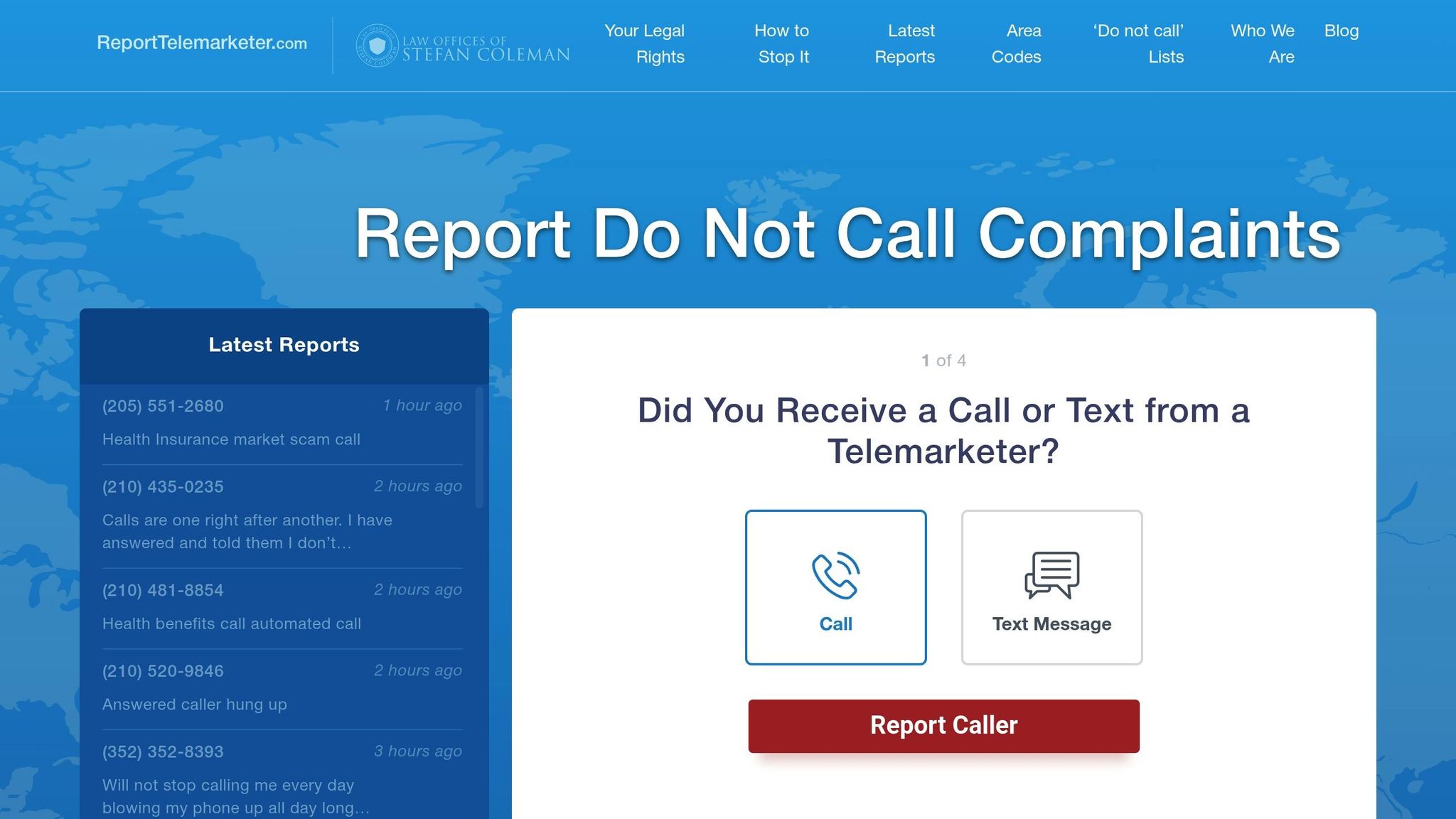
Recent Supreme Court rulings have significantly changed how the Telephone Consumer Protection Act (TCPA) is enforced. These decisions impact both businesses and consumers, reshaping protections against unwanted calls and texts. Here’s a quick overview:
- Narrower Autodialer Definition: In Duguid v. Facebook, automated dialing systems must now use random or sequential number generators to fall under TCPA rules.
- FCC Authority Limited: The Eleventh Circuit invalidated stricter FCC rules on consent, reducing its regulatory power.
- Key Case Pending: McLaughlin Chiropractic v. McKesson will decide if courts must follow FCC interpretations under the Hobbs Act, potentially creating more uniform enforcement.
Quick Changes for Consumers and Businesses
| Aspect | Before | After |
|---|---|---|
| Autodialer Definition | Covered most dialing systems | Limited to random/sequential generators |
| Consent Requirements | Stricter, one-to-one consent needed | Looser, based on original TCPA language |
| FCC Authority | Broad regulatory power | Restricted by court rulings |
Consumers face fewer protections, while businesses must adapt to evolving compliance rules. Stay informed to navigate these changes effectively.
The Supreme Court’s Decision in Facebook Inc. v. Duguid
Major Supreme Court TCPA Rulings
The Supreme Court has issued several decisions that have reshaped how the Telephone Consumer Protection Act (TCPA) is interpreted and enforced. These rulings highlight a trend of courts closely examining agency interpretations of the TCPA.
Duguid v. Facebook Decision
The Supreme Court narrowed the definition of an automatic telephone dialing system (ATDS) in this case. The Court ruled that, to be classified as an autodialer under the TCPA, a system must store or produce numbers using a random or sequential number generator. This decision moved away from broader interpretations, providing clearer guidelines for businesses while limiting certain consumer protections against automated calls. The ruling also set the stage for further scrutiny, as seen in the McLaughlin case.
McLaughlin Chiropractic Associates, Inc. v. McKesson Corporation Case
This case, recently argued before the Supreme Court, focuses on whether district courts must fully defer to the FCC’s interpretation of the TCPA under the Hobbs Act. Specifically, it questions the FCC’s stance that the TCPA does not cover online fax services.
The case has led to a split among circuit courts:
| Circuit Courts | Position on FCC Order Binding Status |
|---|---|
| 2nd, 3rd, 4th, 8th Circuits | FCC orders are not binding on district courts |
| 9th Circuit | FCC orders are binding on district courts |
The Supreme Court’s decision in McLaughlin is expected to address this divide and clarify how much weight courts should give to FCC interpretations. Legal experts believe the ruling will shape how courts balance the authority of federal agencies with the judiciary when enforcing consumer protection laws.
These rulings reflect the Supreme Court’s effort to create a more defined framework for TCPA enforcement, ensuring interpretations align with the law’s original language and intent. The decisions provide clearer, though narrower, guidelines for businesses and consumers navigating their rights and responsibilities under the TCPA.
Effects on Consumers and Telemarketers
Consumer Rights Changes
Recent Supreme Court decisions have scaled back protections for consumers against unwanted calls and texts. The narrowed definition of an ATDS (automatic telephone dialing system) in Duguid v. Facebook means many modern dialing technologies are no longer covered by the TCPA. Additionally, the Eleventh Circuit’s invalidation of the FCC’s 2023 Order eliminated the requirement for one-to-one consent for certain types of calls.
| Consumer Protection Element | Before the Rulings | After the Rulings |
|---|---|---|
| ATDS Definition | Covered most automated dialing systems | Limited to systems using random or sequential number generators |
| Legal Action Options | Broader grounds for TCPA violations | Narrower scope for lawsuits |
| Consent Requirements | Stricter one-to-one consent rules | Looser consent requirements for specific calls |
As these protections shrink, telemarketers are adapting to a patchwork of updated compliance standards.
Telemarketer Requirements
While the Supreme Court’s rulings have relaxed some restrictions, telemarketers still face evolving compliance obligations. The narrower interpretation of the TCPA has particularly impacted rules around automated dialing systems.
Here’s what’s changed:
- Fewer restrictions on technologies that don’t rely on random or sequential number generation
- Looser consent requirements for certain types of calls
- Compliance standards that vary depending on the circuit court’s jurisdiction
For consumers wanting to safeguard themselves from unwanted calls, platforms like ReportTelemarketer.com have become increasingly useful. These tools offer a way to track and report potential violations, even as traditional TCPA protections have weakened.
"The Supreme Court’s decision could lead to increased litigation as parties test the boundaries of the narrowed TCPA scope", say legal experts familiar with the issue.
For telemarketers, these changes mean walking a fine line between operational flexibility and compliance. While some rules have eased, companies still need strong compliance systems to avoid lawsuits and maintain customer trust. This shifting landscape highlights the ongoing redefinition of regulatory authority and consumer rights under the TCPA framework.
sbb-itb-a8d93e1
TCPA Legal Trends
Recent Supreme Court rulings have shifted how the TCPA is applied, impacting both litigation and regulatory enforcement. Circuit courts have taken different stances on how TCPA requirements should be interpreted. For example, the 2nd, 3rd, 4th, and 8th Circuits argue that FCC orders aren’t binding on district courts, while the 9th Circuit insists these orders must be strictly followed.
These differences have created noticeable regional variations in enforcement, especially in cases involving automated dialing systems and consent rules:
| Circuit Court Region | Approach to Interpretation | Effect on Cases |
|---|---|---|
| 2nd, 3rd, 4th, 8th | Independent interpretation | Offers more flexibility in reviewing FCC guidelines |
| 9th Circuit | Strict adherence to FCC orders | Gives more weight to agency interpretations |
| 11th Circuit | Recent key rulings | Limits FCC authority in certain areas |
One noteworthy case, McLaughlin Chiropractic Associates, Inc. v. McKesson Corporation, questions whether the Hobbs Act requires courts to fully defer to FCC interpretations. The outcome could lead to even more variation in how district courts handle TCPA cases.
Another key development is the Eleventh Circuit’s decision to vacate the FCC’s 2023 Order on one-to-one consent. This ruling limits the FCC’s ability to impose requirements that go beyond the TCPA’s original statutory language, further tightening agency authority.
Available Reporting Tools
With recent Supreme Court rulings narrowing TCPA protections, having effective tools to report unwanted telemarketing is more important than ever. As interpretations of the TCPA shift, consumers need reliable solutions to combat intrusive calls and messages.
The FTC’s Do Not Call Registry remains the primary resource for blocking unwanted calls, but it’s not always enough. Specialized services, like ReportTelemarketer.com, have stepped up to address gaps, adapting their approach to match the evolving landscape of TCPA regulations.
ReportTelemarketer.com simplifies the process of reporting and addressing unwanted communications. Here’s a quick look at what the platform offers:
| Feature | Consumer Benefit | Legal Impact |
|---|---|---|
| Investigation Tools | Pinpoints specific TCPA violations | Builds stronger legal documentation |
| Cease & Desist Letters | Takes immediate action against violators | Establishes a formal legal record |
| Formal Complaints | Handles professional complaint filing | Ensures compliance with legal processes |
| Cost Structure | Free for users | Legal fees are pursued from violators |
ReportTelemarketer.com Services

This platform is designed to tackle the challenges posed by recent legal changes that have limited the scope of the TCPA. When users report violations, ReportTelemarketer.com digs deep to uncover breaches of consumer protection laws.
The service follows a three-step process for enforcement:
- Investigating telemarketers using proprietary tools to identify violations
- Sending cease and desist letters to offenders when violations are confirmed
- Filing formal complaints with the appropriate authorities if necessary
This method ensures compliance with current TCPA interpretations while still prioritizing consumer protection. The platform’s legal team monitors court decisions closely, ensuring their tactics stay effective even as rules change.
For those dealing with ongoing telemarketing issues, ReportTelemarketer.com offers a professional, no-cost solution. This is particularly helpful given the technical hurdles introduced by recent rulings on autodialer definitions and consent requirements.
Summary and Next Steps
Recent Supreme Court rulings have brought notable changes to how the TCPA is enforced, impacting both consumers and businesses. The oral arguments in McLaughlin Chiropractic Associates, Inc. v. McKesson Corporation have also reshaped the FCC’s role under the TCPA. These developments call for immediate adjustments by all parties involved.
Key Legal Changes
Recent decisions, including the Eleventh Circuit’s ruling, have shifted the landscape by altering consent practices and limiting the FCC’s authority. Here’s what’s changed:
- Judicial review now restricts the FCC’s authority.
- Consent requirements have reverted to the original statutory standard.
- State laws now play a larger role in consumer protection.
Action Steps and Future Outlook
In light of these changes, businesses need to revisit their compliance strategies. For instance, the District Court of New Jersey clarified that debt collection calls are not subject to TCPA solicitation restrictions, offering clearer guidance for specific industries.
Consumers dealing with unwanted calls should take these steps:
- Keep records of all unwanted communications.
- Report violations (refer to the "Available Reporting Tools" section for details).
- Look into state-level consumer protection laws for additional options.
The outcome of McLaughlin Chiropractic Associates, Inc. v. McKesson Corporation could further influence how courts interpret the TCPA and the FCC’s regulatory power. Legal experts expect more litigation as businesses and consumers adjust to these changes, which might even lead to Congressional updates to the TCPA.
As federal protections narrow, professional reporting services become increasingly useful. For more detailed advice on dealing with telemarketing violations, refer to the "Available Reporting Tools" section.
FAQs
Here are answers to some common questions about the recent Supreme Court decisions and their impact on the TCPA.
What did the Supreme Court decide regarding the TCPA?
The Court narrowed the definition of an autodialer under the TCPA. Now, it only includes devices that use random or sequential number generators to store or produce phone numbers.
How do these decisions affect consumer protection?
The rulings have limited the definition of autodialers, reduced the FCC’s regulatory reach, and returned consent requirements to the original language of the statute. This has scaled back the TCPA’s coverage and introduced new compliance challenges for businesses.
What steps can consumers take under the updated TCPA rules?
- Keep a record of dates, times, and details of unwanted calls or messages.
- Verify whether prior express consent was given.
- Report violations using platforms like ReportTelemarketer.com.
What is the McLaughlin case about?
The McLaughlin Chiropractic Associates, Inc. v. McKesson Corporation case raises questions about whether federal courts must follow FCC interpretations under the Hobbs Act. This could reshape how the TCPA is enforced and the FCC’s role in regulation.
How has the Eleventh Circuit‘s decision changed TCPA compliance?
The Eleventh Circuit, building on prior Supreme Court rulings, struck down the FCC’s 2023 Order on "prior express consent." Key points from the decision include:
- The FCC cannot enforce rules that go beyond what the TCPA statute specifies.
- Consent requirements must adhere to the original provisions of the TCPA.